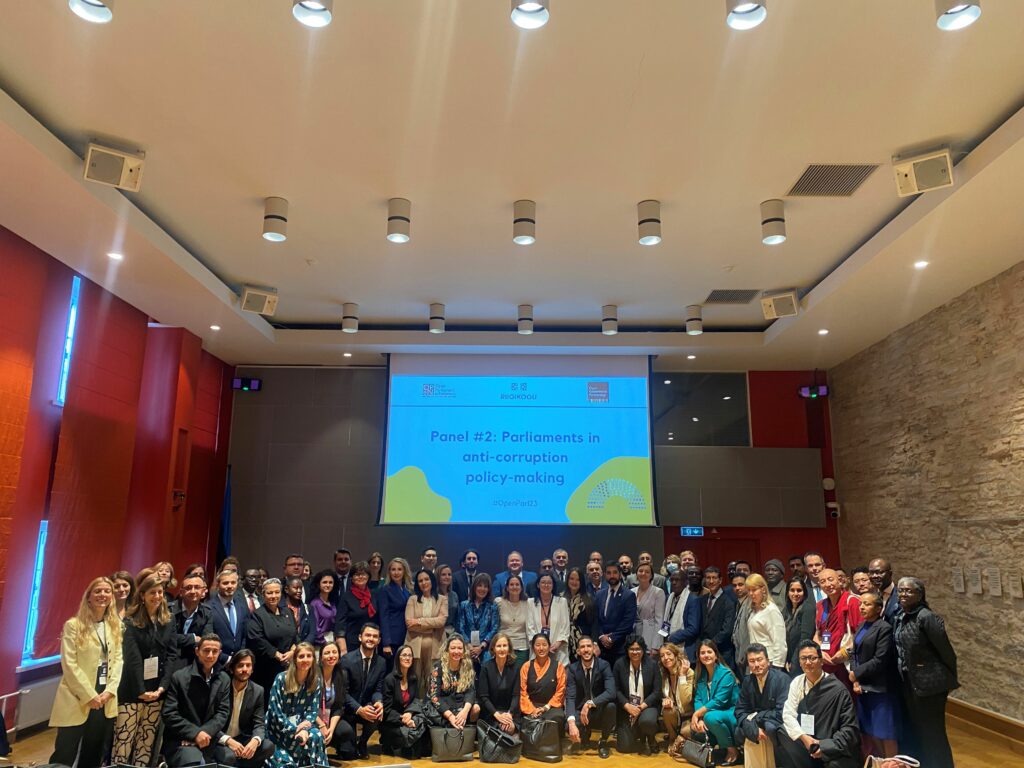(TALLINN, ESTONIA), September 06, 2023 —On Tuesday, September 5, 2023, Open Parliament Day was held within the framework of the Open Government Partnership (OGP) Global Summit, which aimed to convene the open parliament community in person at the Estonian parliament (Riigikogu) to reflect on the role that the legislatures have played in terms of transparency and access to public information, citizen participation, accountability and ethics and probity. It featured the participation of over 100 legislators, parliamentary staffers, and representatives of civil society from around the world, who exchanged initiatives, actions, and challenges for the advancement of this agenda around two central themes: the internal accountability of parliaments and their role in the fight against corruption through cutting-edge initiatives.
The day was opened with remarks by Francis Maude (UK), Member of the House of Lords, who stated that “open data and transparency are the friends of reformers.”, Shreya Basu, Deputy Director of Country Support at the Open Government Partnership; and the Honourable Faris Al-Rawi (Trinidad and Tobago), Minister of Development Rural and Local Governments, who highlighted that “parliamentary openness, through the simultaneous practice of the four pillars, is crucial to achieve good governance, delivering quality representation to our populations, and fulfilling our commitments to international frameworks such as the Sustainable Development Goals.”
The first session entitled “Global Lessons in Parliamentary Transparency and Ethics” was moderated by Kristen Sample, Director of Democratic Governance of the National Democratic Institute, and included the participation of María Baron, Global Executive Director of Directorio Legislativo, and parliamentarians Emmanual Bedzrah (Ghana), Freddy Lim (Taiwan), Fadli Zon (Indonesia) and Boni Khalwale (Kenia). Speakers discussed strategies to strengthen the accountability and integrity of parliaments through participatory processes involving civil society, among others. Speakers concluded that progress on Open Parliament must be consolidated and sustained over time through incentives for stakeholders and positive pressure from parliamentary champions, CSOs and the media. Without the collective approach, it is difficult to drive lasting change.
The second session focused on policy making through cutting-edge initiatives addressing topics such as political finance, beneficial ownership, whistleblowers, public expenditure, as well as oversight of the Executive branch. It was moderated by Franklin de Vrieze, Accountability Head of Practice of the Westminster Foundation for Democracy and showcased presentations by parliamentarians Samuel Perez (Guatemala), Margit Sutrop (Estonia), and Jorida Tabaku (Albania) and former parliamentarian Jackie Speier (United States). Speakers discussed the relevance of having independent bodies created specifically to fight corruption and the effects of whistleblower protection regulations on the transparency of Congresses and public administration in general.
Finally, the closing remarks of the Open Parliament Day were given by Noel Alonso Murray, Executive Director of Directorio Legislativo, who highlighted the role of parliaments in the fight against corruption, particularly in countries where civic space is under threat, and by the Member of the Chamber of Deputies Vlado Mirosevic (Chile), ParlAmericas Board Member, who emphasized the “crucial importance of ethics and probity in public service to ensure that our actions and decisions, and those of other public authorities, promote the common good in an efficient and responsible manner.”
Open Parliament Day 2023 was a joint effort by leading parliamentary organizations and founding members of the Global Open Parliament Network (OpeN), the Open Government Partnership (OGP) and the Riigikogu.
***
About OPEN
OPeN (@OpenParl), is a global consortium made up of the following international organizations Directorio Legislativo, Latin American Network of Legislative Transparency, National Democratic Institute, OSCE Office for Democratic Institutions and Human Rights, ParlAmericas, the Westminster Foundation for Democracy and INTER PARES. OPeN supports parliaments around the world to collaborate with civil society to become more transparent, accountable and participative, as well as to contribute to broader government-led openness initiatives. In this, OPeN members draw on an unrivaled background in relevant programming to advance the four pillars of parliamentary openness – Transparency and Access to Information, Ethics and Probity, Accountability, and Citizen Participation.

